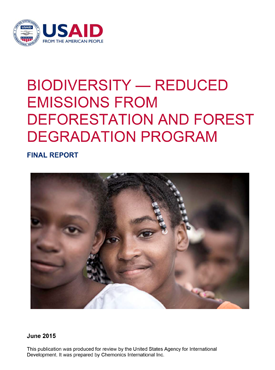In Colombia, the government, local communities, and the private sector have collaborated to mitigate climate change and conserve biodiversity.

Final Report: Biodiversity-Reduced Emissions from Deforestation and Forest Degradation Program .
Project Report | June 30, 2015

The Biodiversity-Reduced Emissions from Deforestation and Forest Degradation Program (BioREDD+) was USAID’s flagship environmental program in Colombia, designed to support the country in mitigating and adapting to climate change and conserving biodiversity.
The work that BioREDD+ produced in the Colombian Pacific region was designed to achieve USAID’s development objective to strengthen Colombia’s efforts to sustainably manage the country’s environmental resources, by addressing climate change, biodiversity conservation, and environmental governance objectives. The BioREDD+ climate change component focused on mitigation and preparing Afro-Colombian and indigenous communities along Colombia’s Pacific coast to develop REDD+ projects for the voluntary carbon market. The biodiversity conservation component worked in partnership with Afro-Colombian and indigenous groups along the Pacific coast; all areas that combined high biodiversity and vulnerability. This mining component was designed to support Colombian institutions in reducing the impact of artisanal small-scale gold mining, which included targeted policy reform, small miner legalization and formalization, recuperation of degraded lands, and mercury reduction or elimination, supported by an effective social communications campaign.
